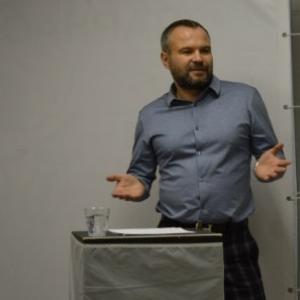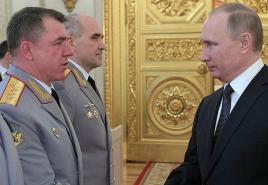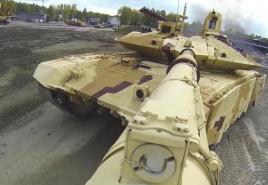Education. Education Master of Foreign Regional Studies
What is “regional studies”Regional studies is a promising specialty that meets the needs of today. It allows you to combine fluency in several foreign languages, which is so necessary today, with a comprehensive study of a particular region, practical knowledge that allows you to analyze the current situation and predict the development of the region.
This approach, unique to this specialty, with a special emphasis on the humanitarian aspect, on the ethno-social world structure, allows graduates to take their place in a world where the need to establish interpersonal and intercultural contacts is becoming increasingly acute. The faculty's curriculum is primarily related to the field of international administration and business, the field of international scientific and cultural cooperation, international relations in the field of education, and the activities of international public organizations.
About the direction “Regional Studies of Russia”
“To prepare specialists on Russia who will be able to tell the world about it in the languages of the world is the most important scientific, social, and patriotic task, which the Regional Studies of Russia program at the faculty has been carrying out since 2001 foreign languages and regional studies of Moscow State University named after M.V. Lomonosov, the flagship of Russian education.
The development of this program is a logical consequence of the most important principle of teaching foreign languages at our faculty: knowledge of the languages and cultures of other peoples is flawed and incomplete without broad background knowledge of the native world, since partners in international communication are primarily interested in this information, and not at all in the ability to tell them about their lives in their language."
Doctor of Philology, Honored Professor of Moscow State University named after M.V. Lomonosov, FIAR President S.G. Ter-Minasova
Graduates are awarded the degree “Master of Foreign Regional Studies” and “Master of Regional Studies of Russia”.
Duration of training – 2 years.
Form of education – full-time (full-time).
Regional studies of Russia:
Budget places -10
Contract places -5
Foreign Regional Studies:
Contract places -10
Directions and specializations (programs)
- "Regional Studies of Russia"
- "Foreign Regional Studies"
Master's program "Sociocultural regional studies of countries and regions" North America»
Master's program "Technology for creating a positive image of the European region"
Master's program "Technology for creating a positive image of the North America region"
Syllabus
Mandatory academic disciplines in the direction of "Foreign Regional Studies"
Compulsory academic disciplines in the direction of “Regional Studies of Russia”
Master's students have the opportunity to study the following foreign languages: English, German, French, Spanish, Italian and Chinese.
Research and production practices occupy a significant place in the curriculum.
IN educational process are used different kinds training: lectures, seminars, workshops, trainings. Students are given the opportunity to immerse themselves in their chosen specialty: meetings are organized for them with representatives of science, culture and the business world, political and public figures. Students visit companies and organizations, work on independent projects, and actively participate in the scientific life of the faculty, including scientific conferences, seminars and round tables.
Particular attention is paid to learning a foreign language. Various aspects of the language are studied as part of the curriculum: regional varieties in English, language of means mass media and many others.
It is mandatory to study a second foreign language: English, German, French, Spanish, Italian or Chinese.
A master's degree in regional studies allows you to work as a referent, expert, researcher, consultant, translator of the language of the region being studied in commercial structures, government agencies, scientific and educational institutions Russian Federation.
Admission conditions
If you have a state-recognized bachelor's or specialist's diploma of higher education, entrance examinations are conducted in English and the specialty (Foreign regional studies or Russian regional studies) in written form.
Students from other countries who wish to enroll in a master's program must speak Russian at a level sufficient to master the educational program.
Required documents
For Russian citizens:
- copies of documents proving the identity and citizenship of applicants (have the original with you), if a document is provided foreign country about education, an original or a copy of the certificate of recognition is provided foreign education;
- original or copy of document on higher education and qualifications;
- 2 photographs (size – strictly 3x4 cm, matte, black and white).
For citizens of other countries:
- state-issued diploma with an attachment (original) (a diploma from another state must be nostrified and legalized at Rosobrnadzor at the address: Moscow, Ordzhonikidze St., 11, building 9, floor 2, room 13);
- 2 photographs (size – strictly 3x4 cm, matte, black and white);
- passport with Russian visa;
- medical certificate f-086u (with a note on the results of the HIV test); a certificate received in another state must be nostrified at the clinic of Moscow State University named after M.V. Lomonosov;
- migration card.
Those who wish can continue your education in graduate school in the following scientific specialties:
- 02/10/04 - “Germanic languages” (philological sciences);
- 02/10/05 - “Romance languages” (philological sciences);
- 02/10/20 - “Comparative-historical, typological and comparative linguistics” (philological sciences);
- 02/10/01 - “Russian language” (philological sciences);
Master's degree
Second level of the system higher education. Master's programs produce professionals with more in-depth specialization who are capable of solving complex tasks.
ISSU implements master's programs of two types:
1. A master's degree is like a second (for some people a third, etc.) higher education. We are talking about the opportunity for specialists working in the system of state and municipal government, economics, science, and business to acquire a new specialty and new knowledge.
Since 2010, “second higher education” programs have been excluded from the Russian education system, but the need for training and acquiring new knowledge and competencies has remained. Under these conditions, second higher education programs were replaced by programs of a higher quality level - Master's degrees.
If we compare the programs of the previous second higher education and master's programs, then the priority of the latter is obvious - practical orientation, specialized training, a significant number of disciplines of the student's choice, defense of a master's thesis.
2. Master's degree as the first higher education - programs for bachelor's graduates of specialized universities who want to deepen their knowledge in the previously chosen field of study, as well as bachelor's graduates of non-core universities who want to continue their education in a new field of study and expand their competencies. IGSU master's programs are aimed at both bachelor's graduates of IGSU and other faculties of RANEPA and Russian universities.
The main objective of the master's program is to prepare professionals for a successful career in the system of state and municipal government, international and Russian companies, as well as analytical, consulting and research activities.
Unlike a second higher education, master's studies culminate in the defense of a master's thesis. A master's thesis is undoubtedly a work of a higher level than traditional thesis. IGSU master's graduates get a real opportunity to develop their master's theses to the level of candidate's theses. ISSU has an extensive network of postgraduate studies and 8 dissertation councils.
The obvious advantage of IGSU master's programs is the traditionally high professional and human level of students. ISSU's master's program is not only a platform for gaining knowledge, but also an opportunity to communicate with successful people in life and establish new human and business contacts.
Main goals educational activities WIS according to the Charter are:
Satisfying the individual's needs for intellectual, cultural and moral development through education;
Satisfying the needs of society and the state for qualified specialists with higher vocational education, in scientific and scientific-pedagogical personnel of the highest qualification.
Education at the Institute of Oriental Countries is conducted in Russian.
Implemented educational programs
The WIS educational process in 2018-2019 is organized at the following levels:
| Educational program | The level of education | Standard training period | Validity period of state accreditation of the educational program (if state accreditation is available) | ||
| Full-time education | Part-time and part-time education | Extramural studies | |||
| 03/41/01 Foreign regional studies | Bachelor's degree academic | 4 years | - | - | |
| 38.03.01 Economics | Bachelor's degree academic | 4 years | - | - | |
| 45.03.02 Linguistics | Bachelor's degree academic | 4 years | - | - | license No. 2504 dated December 20, 2016 |
| 04/41/01 Foreign regional studies | Master's degree | 2 years | - | - | Certificate of state accreditation No. 2625 dated June 21, 2017 |
Additional general education programs - preparation for entering a university, corporate education, courses, etc.
The main concept embedded in the content of educational programs is to ensure a high level of theoretical knowledge, build interdisciplinary connections in the educational process, strengthen the practical component and update the educational process. Educational objectives and plans are processed in a timely manner as new goals and objectives appear, formulated in the state policy of the Russian Federation. The goals and objectives of educational programs are reflected in the long-term development strategy of the institute for 2014-2020.
Already at the stage of creating educational programs, cooperation with the Institute of Oriental Studies of the Russian Academy of Sciences was especially fruitful: material (library) and intellectual resources were involved: development of lecture courses, attracting students to participate in joint scientific conferences and congresses, student internships in scientific departments, etc.
An innovative approach to the development of educational and methodological complexes of disciplines was to use educational process materials on the most current international projects that meet the new challenges of our time, and holding scientific conferences in these areas with the participation of both teachers and students. Best works students are published in conference proceedings, collections of articles, journals, and on the websites of the Institute of Oriental Countries and the Institute of Oriental Studies of the Russian Academy of Sciences.
| Direction of training | Educational program | Annotations to work programs of disciplines | Calendar training schedule | Practices | Methodological and other documents |
| Foreign regional studies 03/41/01 | annotations | Students' class schedule Educational practice - Economics |
|||
| Economics 03/38/01 | annotations | ||||
| International relationships | annotations | ||||
| Linguistics 03/45/02 | annotations | ||||
| Master's Degree in Foreign Regional Studies 04/41/01 | annotations |
Information on admission results in 2017-2018 academic year at OCHUVO "Institute of Eastern Countries"
| Code | Form of study | Number of students, people | Average score for all entrance examinations | ||||
| at the expense of budgetary allocations from the federal budget | at the expense of the budgets of the constituent entities of the Russian Federation | at the expense of local budgets | at the expense of individuals and (or) legal entities | ||||
| 41.03.01 | Foreign Regional Studies | In-person | - | - | - | 33 | 200,5 |
| 38.03.01 | Economy | In-person | - | - | - | 1 | 194 |
| 41.03.05 | International relationships | In-person | - | - | - | 1 | 259 |
| 41.03.05 | International relationships | Part-time | - | - | - | 3 | 146,3 |
| 41.03.01 | Foreign Regional Studies | Part-time | - | - | - | 8 | 198,1 |
| Master's degree | |||||||
| 41.04.01 | Foreign Regional Studies | In-person | - | - | - | 9 | - |
Information on the results of transfer, restoration and deduction to the OCHU VO “Institute of Eastern Countries”
| Code | Name of specialty/area of training | Form of study | Number of students, people | |||
| Transferred to other educational organizations | Transferred from other educational organizations | restored | expelled | |||
| Bachelor's degree | ||||||
| 41.03.01 | Foreign Regional Studies | In-person | 21 | |||







